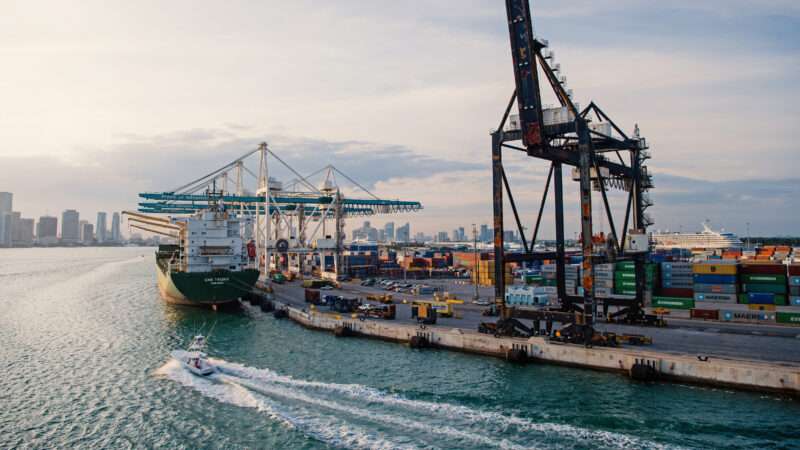
Vice President Kamala Harris unveiled a plan on Sunday to increase "access to reliable, affordable electricity" in Puerto Rico and strengthen the island's grid against extreme weather. Like other Harris proposals, the plan would inflate the size of the federal government through top-down decision making and increase tax credits for Harris' preferred energy sources. Noticeably, Harris' proposal does not include a repeal of the Jones Act, which for decades has increased energy costs and hurt grid reliability in Puerto Rico.
The Merchant Marine Act of 1920, also known as the Jones Act, requires any goods being shipped between U.S. ports to be transported on an American-owned, built, and flagged vessel with a majority American crew. Originally intended to protect U.S. shipbuilding, the Jones Act has made America's maritime industry less competitive while increasing costs for consumers.
The failures of the Jones Act have disproportionately hurt Puerto Rico. In 2017, when Hurricane Maria ravaged the island, U.S. aid was delayed for more than a week until President Donald Trump signed a 10-day Jones Act waiver. Hurricane relief efforts were yet again stalled in 2022 after Hurricane Fiona. This time a BP tanker with 300,000 gallons of diesel remained idle off of the coast of the island until President Joe Biden granted a waiver for the ship.*
But even aside from disaster relief efforts, the Jones Act has also made energy in Puerto Rico more expensive and less reliable. Despite ambitious plans to source 100 percent of its electricity from renewable sources, Puerto Rico relies on fossil fuels for 94 percent of its electricity needs. However, since there are no Jones Act–compliant liquefied natural gas (LNG) tankers, Puerto Rico can't just have LNG shipped in from continental U.S. Compliant coal vessels are few and far between too, so Puerto Rico is forced to source a majority of its fossil fuels from foreign nations.*
For Puerto Rico's citizens, the costs of these decisions are exorbitant. "For every dollar per barrel in additional costs imposed by the Jones Act, Puerto Rico is effectively paying an annual tax of $14 million," according to Colin Grabow and Alfredo Carrillo Obregon of the Cato Institute. Meanwhile, the cost of using Jones Act–compliant barges to move propane around the island brings on $3 million to $5 million in additional costs for consumers.
The cost of the law is not lost on Puerto Rico's government. In 2018 the island applied for a 10-year waiver for U.S. LNG, which was ultimately denied. Had it been approved, the measure would have saved the island an estimated $800 million.
With artificially high energy costs, Puerto Rico has struggled to rebuild its power grid cost-effectively after hurricanes, which has led to outages and the suspension of maintenance projects. The island's forced outage rate, which is the likelihood that a power station will be unavailable for service when needed, is 30 percent. Florida, meanwhile, has a forced outage rate of 3 percent.
Just as this law has hurt Puerto Rico's power grid in the past, it also poses a threat to the island's goal of 100 percent renewable energy. Offshore wind energy production in the U.S. has been stunted in part due to the Jones Act.
Before the construction of a $715 million vessel, Dominion Energy's Coastal Virginia Offshore Wind project was forced to ferry turbine blades from Halifax, Canada, to Virginia Beach because no Jones Act–compliant barge existed. While Dominion's consumers won't have to pay for the construction of the vessel, they will have to pay for using it for the installation of the turbines. Danish clean energy developer Ørsted, meanwhile, was forced to cancel two offshore wind projects in New Jersey last year due to a lack of available ships.
While Puerto Rico may be able to skirt some of these restrictions by sourcing its materials from foreign ports, the Jones Act will inevitably rear its ugly head just as it has done in the past. Absent the construction of offshore wind turbines, the Jones Act will continue to restrict the import of affordable LNG, which will be needed to provide baseload power to the island's renewable sources.
To be sure, the Jones Act is not the only cause of Puerto Rico's energy woes. The responsibility rests at least partially on the island's government, which is riddled with corruption and is pursuing an energy plan that is not contingent on market signals and that excludes nuclear power—the most reliable source of electricity available.
Fixing Puerto Rico's grid is a daunting task. Harris' plan to have the federal government lead on the issue will result in higher project costs and longer timelines. Instead of increasing the size and scope of the government, lawmakers should repeal harmful regulations like the Jones Act.
*CORRECTION: The original version of this article mischaracterized Biden's waiver and Puerto Rico's source of fossil fuels.
The post If Kamala Harris Wants To Lower Energy Costs in Puerto Rico, She Should Support the Repeal of the Jones Act appeared first on Reason.com.







